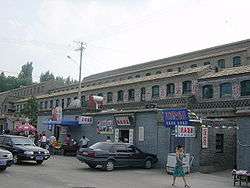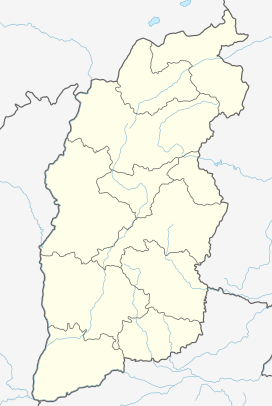Dazhai
Dazhai (Chinese: 大寨; pinyin: Dàzhài; Wade–Giles: Tachai) is a village and former commune of several hundred farmers in Xiyang County in eastern Shanxi province, chiefly known for Mao Zedong's directive, "Learn from Dazhai in agriculture", which set up Dazhai as the model for agricultural production throughout China during the 1960s and 1970s, amid the Cultural Revolution.[1]
Dazhai 大寨村 | |
|---|---|
Village | |
 | |
 Dazhai Location in Shanxi | |
| Coordinates: 37°34′17″N 113°43′10″E | |
| Country | China |
| Province | Shanxi |
| Prefecture-level city | Jinzhong |
| County | Xiyang |
| Town | Dazhai Town |
| Elevation | 948 m (3,110 ft) |
| Time zone | UTC+8 (China Standard) |
'Learn from Dazhai'
Numerous newspaper and magazine stories and books as well as films were published nationwide about how hard and diligently the villagers of Dazhai had worked to build the village into one with not only well-managed fields and bountiful crops, but engineering marvels such as amazing reservoirs and grandiose aqueducts crossing deep valleys for irrigation. Under the leadership of Chen Yonggui, the villagers endeavored to tame the nature by turning the mountainous ridges and hills into productive fields and enhancing productivity in such an unfriendly environment. Miraculously, Dazhai indeed became a model for Chinese farmers to contribute grain to the state. They allegedly worked on their own on the principle of self-reliance, without any financial and technical support from the government.[2]
A number of songs about Dazhai were popular for a while, the best-known perhaps being Dazhai Yakexi (yakexi is the Mandarin transliteration of the Uyghur word meaning good or great), about a Uyghur farmer telling how happy he was after he visited Dazhai. The song was adapted to a dance in which a Uyghur male sang while six ladies accompanied him with dances in the Uyghur traditional style. Both the singer and the dancers were in clothing typical of the Uyghur nationality, which the Han Chinese people found aesthetically appealing. Another is an instrumental piece entitled "The Red Flower of Dazhai Blossoms Everywhere" (Dazhai Hong Hua Bian Di Kai, 大寨红花遍地开).
See also
- Learn from Daqing in industry (The industrial counterpart of Dazhai)
- Mao Zedong Thought
- Potemkin village
- shanzhai
References
- Spence's "The Search for Modern China" 2nd Edition, p.562
- Patrick Fuliang Shan, "Chen Yonggui Revisited: Intriguing Figure, Diverse Identities, and Maoist Regimentation," American Journal of Chinese Studies, (Vol. 25, no. 1, April 2018), pp. 31-46.
Further reading
- Hinton, William (1999-09-27). "Visions of China: Dazhai Mao's Beloved Model Village". 154 (12). TIME Asia.
External links
- China-dazhai.com - a comprehensive website about Dazhai
- Zhao, "Socio-spatial transformation in Mao's China : settlement planning and dwelling architecture revisited (1950s-1970s)", Chapter 5 : Dazhai, a rural settlement, Katholieke Universiteit Leuven, 2007
- Posters of Chen Yonggui
- Soils and Sustainability: Tales from the Loess Plateau
- The Dazhai Spirit gets religion